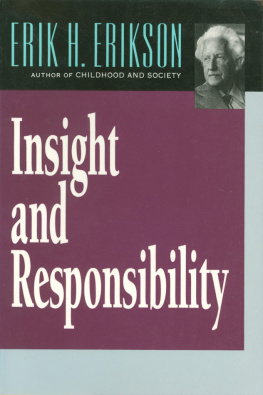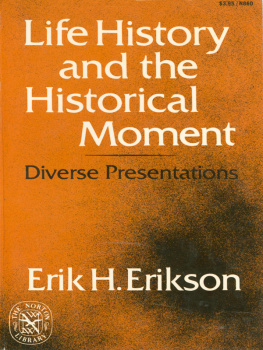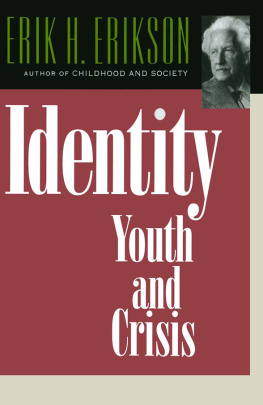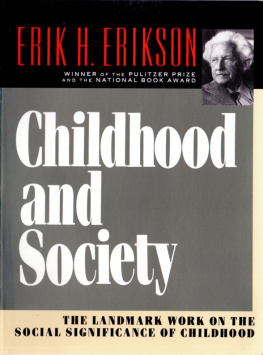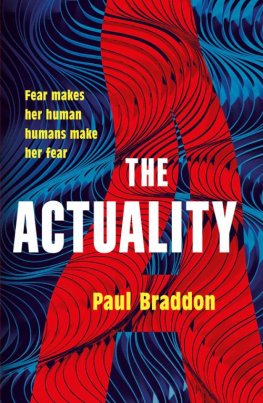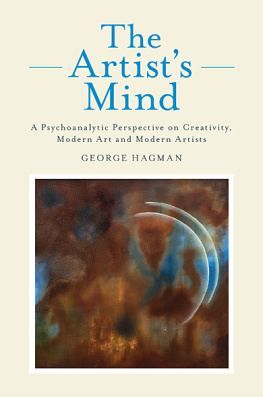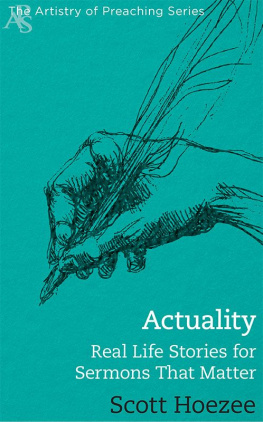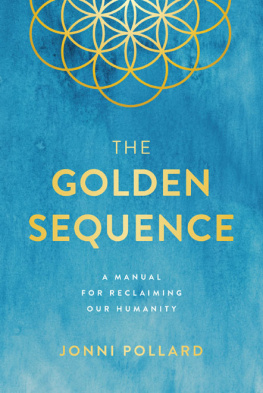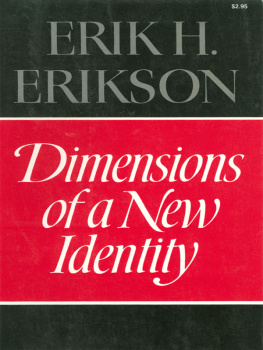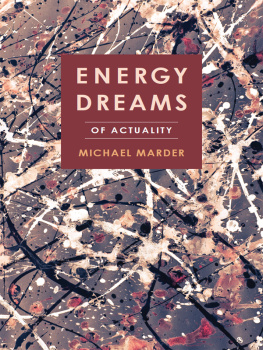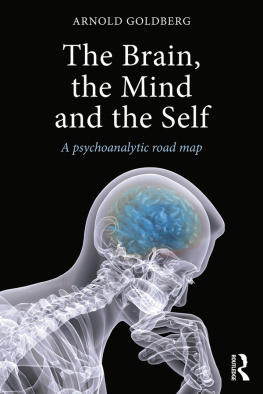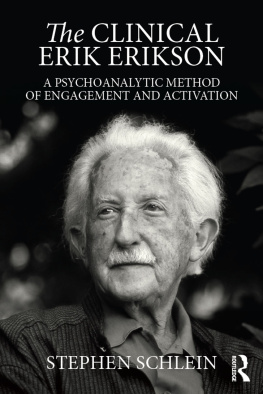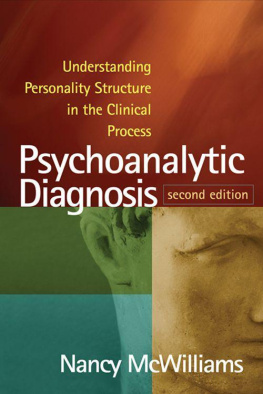
BY ERIK H. ERIKSON
Childhood and Society (1950, 1963)
Young Man Luther (1958)
Insight and Responsibility (1964)
Identity: Youth and Crisis (1968)
Gandhis Truth (1969)
Dimensions of a New Identity (1974)
Life History and the Historical Moment (1975)
Toys and Reasons (1977)
Identity and the Life Cycle (1959, 1980)
The Life Cycle Completed (1982)
Vital Involvement in Old Age (with Joan M. Erikson and Helen Q. Kivnick) (1986)
A Way of Looking at Things: Selected Papers from 1930 to 1980 (edited by Stephen Schlein, Ph.D.) (1987)
EDITED BY ERIK H. ERIKSON
Adulthood (1978)

To
Anna Freud
IT IS NOT UNUSUAL to publish a series of lectures addressed to one and the same audience. The lectures published here, however, were given on three continents. Their unity, one might think, could lie only in the speakers desire to repeat himself in widely distant places. Yet, while each lecture marked a different and distinct occasion, all but one of these occasions called for an address, and all converged on a common theme. A commemoration of Freuds hundredth birthday in Germany; a memorial lecture for a young psychiatrist; an academic lecture in my professional association; an address in Indiaon all of these occasions I felt called upon to speak of the light thrown by clinical insight on the responsibilities which each generation of men has for all succeeding ones. That the most common response among such a variety of listeners was the remark, I look forward to reading it, may not necessarily signify the unmixed success of the spoken word, but it does add a reason for offering these lectures in print.
In revising them, I have endeavored to link the common themes more clearly. I have also enlarged some lectures considerably, two to twice their size. The questions asked by a critical audience are often already answered in the lecturers notes, that is, in just those passages which he chose to omit as relatively expendable. I have restored such passages here. On occasion, however, I have simply welcomed the opportunity of spelling out what I would have said had I not been restricted by requirements of time.
The level of discourse in these lectures is called insight. This is a form of discernment hard to define and harder to defend, for it includes those preconscious assumptions which both precede and follow proven knowledge and formulated theory, and it includes enlightened common sense and informed partisanship. Without all of these, the clinician can neither heal nor teach; while he often comes face to face with his insights only in the act of interpreting, advising, or, indeed, lecturing. By then, however, he may find himself formulating conceptions which must again be verified in systematic observation. Thus responsibility always renews itself.
If finding expression for such insights is one of the speaking clinicians tasks, and the building of theory another, then this book, by its nature, goes to the limit of the first task and will be found wanting in the second.
The geographic and thematic range of the lectures makes it impossible to thank all the individuals who helped in their planning and delivery, although I think of each occasion as a rare experience of challenge and friendship. The sponsoring organizations are noted at the beginning of each lecture. All but the last of the lectures were planned while I was on the staff of the Austen Riggs Center in Stockbridge and in the lifetime of my friend and critic David Rapaport. During the whole period I was partially or wholly supported by grants of the Ford Foundation and of the Shelter Rock Foundation to the Austen Riggs Center. The lectures were collected and revised during my fellowship in the Center for Advanced Studies in the Behavorial Sciences during the spring of 1963.
Joan Erikson edited this book and has been, throughout, companion to its insights.
References are for the most part restricted to the acknowledgment of quotations. This leaves a number of debts of appreciation and of refutation as yet unpaid.
E.H.E.
Cotuit, Massachusetts
THE LECTURES IN THIS VOLUME have been published in earlier versions in various books and periodicals:
THE FIRST PSYCHOANALYST appeared in the Yale Review, 46:4062, 1956, and was reprinted in Freud and the Twentieth Century, edited by Benjamin Nelson, Gloucester: Peter Smith, 1958.
THE NATURE OF CLINICAL EVIDENCE was first published in Daedalus, 87:6587, 1958, and reprinted in Evidence and Inference, edited by Daniel Lerner, Glencoe: The Free Press, 1959.
IDENTITY AND THE UPROOTEDNESS OF OUR TIME was published in Uprooting and Resettlement, Bulletin of the World Federation for Mental Health, 1959.
HUMAN STRENGTH AND THE CYCLE OF GENERATIONS first appeared in the form of a much briefer paper, The Roots of Virtue, in The Humanist Frame, edited by Sir Julian Huxley, New York: Harper and Bros., 1961.
PSYCHOLOGICAL REALITY AND HISTORICAL ACTUALITY appeared in a briefer version titled Reality and Actuality in The Journal of the American Psychoanalytic Association, 10:451473, 1962.
THE GOLDEN RULE IN THE LIGHT OF NEW INSIGHT in its first form was published as The Golden Rule and the Cycle of Life in the Harvard Medical Alumni Bulletin, Vol. 37, No. 2, 1963, and was reprinted in The Study of Lives, edited by R. W. White, New York: Appleton-Century-Crofts, 1963.
In each case the lectures were revised and expanded for publication in their present form.
Heaven does with us as we with torches do
Not light them for themselves. For if our virtues
Did not go forth of us, twere all alike
As if we had them not.
Measure for Measure
The 100th birthday of Sigmund Freud presented an occasion to introduce a new generation of German students to an event in the history of European thought which had been all but obliterated by National Socialist teaching: the discovery of psychoanalysis. The following address was delivered at a ceremony held jointly by the universities of Frankfurt and Heidelberg, at the University of Frankfurt, on May 6, 1956.
IT IS A SOLEMN and yet always a deeply incongruous occasion when we select an anniversary to honor a man who in lonely years struggled through a unique experience and won a new kind of knowledge for mankind. To some of us, the field created by Sigmund Freud has become an absorbing profession, to some an inescapable intellectual challenge, to all the promise (or threat) of an altered image of man. But any sense of proprietary pride in the man to be honored this year should be sobered by the thought that we have no right to assume that we would have met his challenge with more courage than his contemporaries did in the days when his insights were new. It seems fitting to use his centenary to review some of the dimensions of lonely discovery.
It is not easy (unless it be all too easy) for a Freudian to speak of the man who was Freud, of a man who grew to be a myth before our eyes. I knew Freud when he was very old, and I was young. Employed as a tutor in a family friendly to him I had the opportunity of seeing him on quiet occasions, with children and with dogs, and at outings in the mountains. I do not know whether I would have noticed Freud in a crowd. His notable features were not spectacular: the finely domed forehead, the dark, unfathomable eyes, and certain small indomitable gesturesthey all had become part of that inner containment which crowns the old age of good fighters.
Next page
